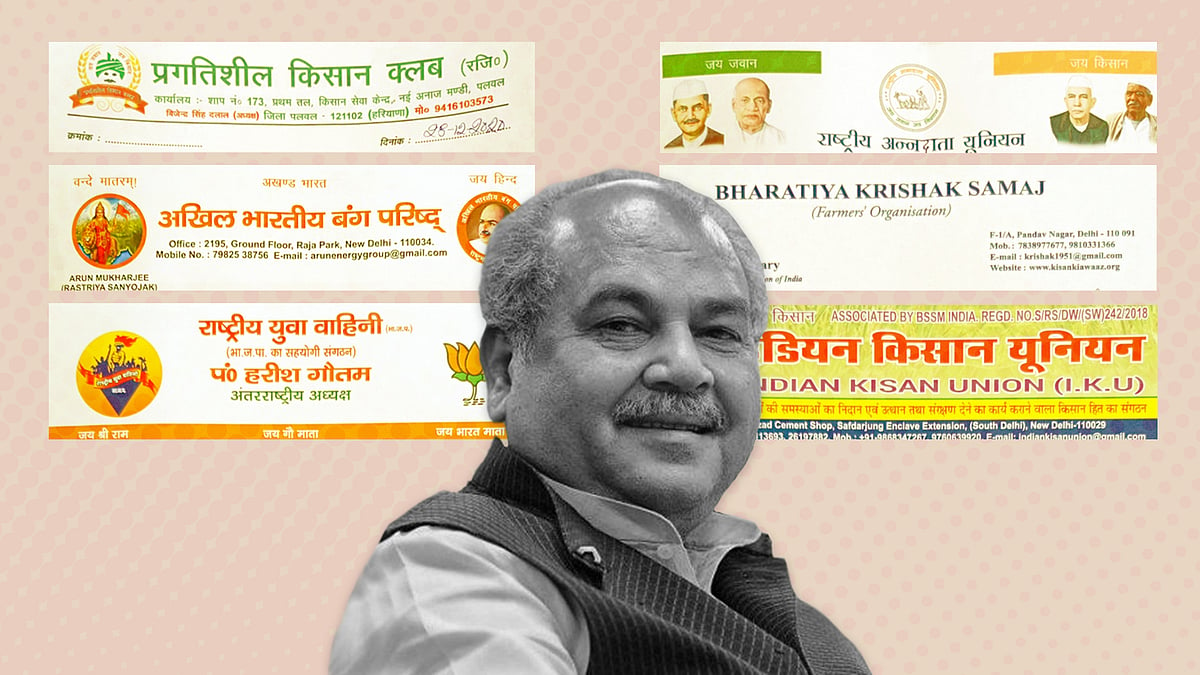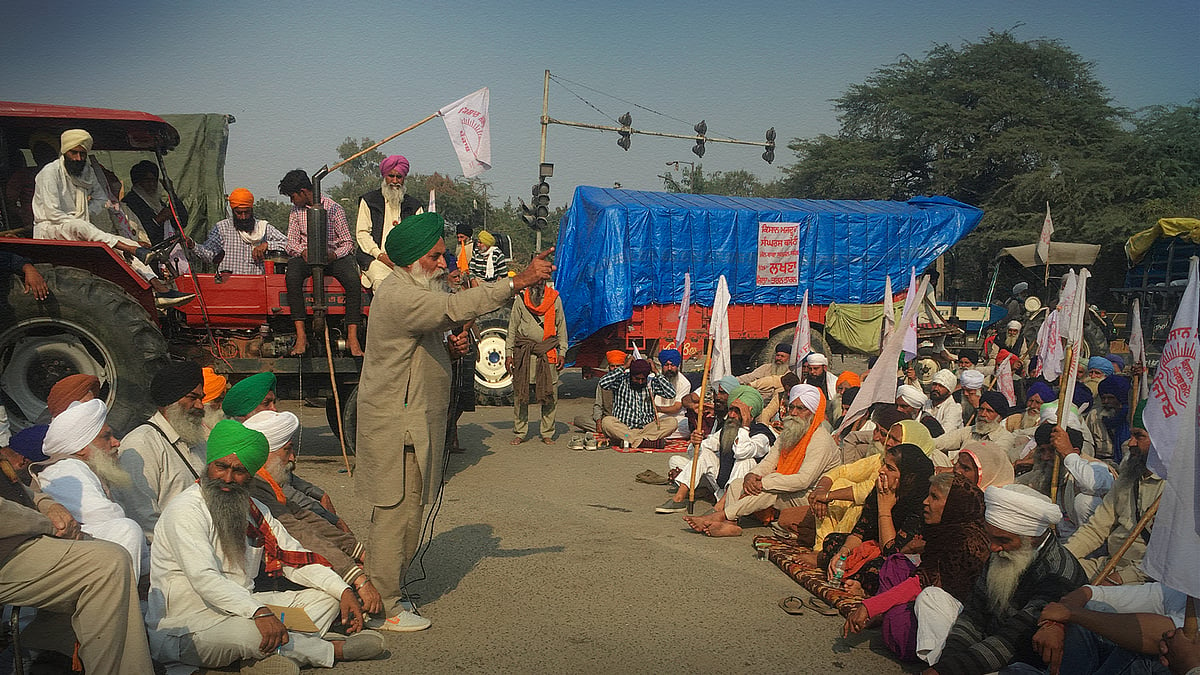Farmer protests: All four members of SC panel back new farm laws
They are on record supporting the Modi government’s position on the three laws that farmers want repealed.
The Supreme Court today stayed the implementation of the three contentious farm laws that farmers are currently protesting against along Delhi’s border. On Monday, the top court had observed that these new pieces of legislation were passed without due consultation.
Additionally, a bench led by Chief Justice of India SA Bobde appointed a committee to resolve the standoff between the protesting farmers and the Narendra Modi government. The four members of the committee are Bharatiya Kisan Union president Bhupinder Singh Maan, policy expert Pramod Joshi, agricultural economist Ashok Gulati, and Shetkari Sanghatana president Anil Ghanwat.
The protesting farmers are demanding the repeal of the new laws and legal backing for the minimum support price programme. On Monday, farmers unions leading the protest had rejected the top court’s suggestion to appoint a committee to resolve the ongoing crisis.
A look at the views of the four members of the committee – two farmer leaders and two experts – formed by the court on Tuesday might give us a clue about why the farmer unions are skeptical of such a body resolving the standoff.
Ashok Gulati
In May 2020, when reports about the plans to reform Indian agriculture appeared in the media, Gulati wrote in the Indian Express that the Modi government “deserves compliments for finally introducing reforms in the country’s agri-marketing system”. He added that the reforms could be “a harbinger of major change in agri-marketing, a 1991 moment of economic reforms for agriculture”.
In 2015, Gulati was honoured with the Padma Shri by the president. He is now the Infosys Chair Professor for Agriculture at the Indian Council for Research on International Economic Relations.
In September, in a piece titled “On farm bills, government must get its act together, but Opposition is misguided” in the Indian Express, Gulati argued that the rationale of the farm bills was to provide “greater choice and freedom to farmers to sell their produce and to buyers to buy and store, thereby creating competition in agricultural marketing”.
However, he cautioned that “sometimes good ideas/laws fail because of bad implementation”, referring to a scheme introduced by the late finance minister Arun Jaitley to stabilise the prices of tomato, onion and potato in 2018.
In November, four days after the farmer protests began, Gulati was asked by India Today anchor Rajdeep Sardesai why he thought the protesting farmers were angry about the laws. Gulati said the farmers’ claims of corporate takeover of agriculture, erosion of the minimum support price protection, and the collapse of the mandi system rested on a “massive misinformation campaign”.
In December, the economist told the Wire that the Centre should suspend the farm laws for six months and compensate farmers, but not repeal the laws.
Pramod Kumar Joshi
Joshi, an agricultural policy expert and former director of the South Asia International Food Policy Research Institute, told Mint in 2014 that the Economic Survey’s recommendation to override the mandi system and amend the Essential Commodities Act – which one of the three new laws does – would “help farmers get better returns and promote agricultural diversification, at least in those states where private markets are already developed”.
“In poorer areas,” he added, “the private sector can now develop markets.”
In September this year, Joshi told a panel discussion organised by Agrivision, an Israeli agri-business consulting firm, that the farm bills “would be helpful in creating favorable conditions to make farming profitable”, adding that the farmers’ fears regarding the end of MSP were “baseless”.
In December, in a co-authored piece for the Financial Express, Joshi held the farmers responsible for not resolving their grievances with the Modi government. “It is regrettable that the farmers’ agitation has not yet been resolved despite the Centre’s positive response on considering genuine demands,” he wrote.
Joshi also accused the protesters of changing goalposts before every negotiation with the Centre. He even contradicted one of the observations the Supreme Court made on Tuesday. “Initially, it was claimed that the laws were framed without consulting farmers and farmer organisations,” he said, “this is an unfair claim. The issue of deregulating agricultural markets has been under discussion and been debated for the last two decades.”
Contra Joshi, the SC told the government on Monday that it didn’t know what consultative process had been followed before making the laws. “We are sorry to say that you, as the Union of India, are not able to solve the problem,” the court observed. “You have made a law without enough consultation resulting in a strike. So you have to resolve the strike.”
The same month, Joshi’s views on the farmers’ demand for a law on MSP were carried by news website Goan Connection. “It is very difficult to make MSP mandatory by law. It does not exist anywhere in the world,” he was quoted as saying. “A law on MSP would mean the right to MSP. Those who do not get MSP would then be able to move court, and those not giving MSP would be penalised.”
Anil Ghanvat
Ghanwat is the president of the Shetkari Sanghatan, a Maharashtra-based farmers’ organisation founded by late farmer leader Sharad Joshi.
His organisation claims that it’s opposed to the main demand of the protesting farmers – to repeal the new laws – but advocates amendments to suit the protesters’ wishes.
In October, the Shetkari Sanghatan even held a demonstration in support of the farm bills.
“The government can stay implementation of the laws and amend them after discussions with farmers,” Ghanwat told the Hindu Businessline in December. “However, there is no need to withdraw these laws, which have opened up opportunities for farmers.”
Later that month, soon after meeting with agriculture minister Narendra Singh Tomar, Ghanwat told the Indian Express that for the “first time in the last 40 years” farmers had a chance to benefit from the open market.
“If under pressure from farmers in just two states the central government takes the decision to repeal the Act,” he added, referring to Punjab and Haryana, “it would mean the end of the road for this (initiative).”
Bhupinder Singh Mann
Mann is a former Rajya Sabha MP and the national president of Bharatiya Kisan Union (Mann). In December 2020, Mann led a delegation of farmer groups from Haryana, Maharashtra, Bihar, and Tamil Nadu to meet Tomar and hand over a memorandum demanding that the three new laws be implemented with a few amendments.
“Reforms are needed in order to make agriculture competitive,” Mann told the Hindu afterwards. “But safeguards are needed to protect farmers, and anomalies must also be corrected.”
What specific amendments did Mann demand? In September 2020, News18 reported that the farmer leader had written to Modi arguing that the new laws would not help the farmers in their present form. They had created a fear, he wrote, that MSP will be removed.
“Mann said, to remove the fear of ending MSP, an ordinance should be guaranteed that farmers will get MSP,” said the News18 report. “All buyers must be legally bound to purchase on MSP. Whether they are government or private. Strict legal action should be taken against the violators.”
Mann is an old proponent of private players entering agriculture. In 2008, he and Shetkari Sangathana’s Sharad Joshi had staged a demonstration against the Manmohan Singh government’s decision to ban corporates from procuring wheat from Punjab and Haryana.
 Who are the ‘farmer leaders’ supporting Modi on farm laws?
Who are the ‘farmer leaders’ supporting Modi on farm laws? A matter of trust: Why farmers want MSP written into law
A matter of trust: Why farmers want MSP written into law
